Yingxiu Zhao
STEP3-VL-10B Technical Report
Jan 15, 2026Abstract:We present STEP3-VL-10B, a lightweight open-source foundation model designed to redefine the trade-off between compact efficiency and frontier-level multimodal intelligence. STEP3-VL-10B is realized through two strategic shifts: first, a unified, fully unfrozen pre-training strategy on 1.2T multimodal tokens that integrates a language-aligned Perception Encoder with a Qwen3-8B decoder to establish intrinsic vision-language synergy; and second, a scaled post-training pipeline featuring over 1k iterations of reinforcement learning. Crucially, we implement Parallel Coordinated Reasoning (PaCoRe) to scale test-time compute, allocating resources to scalable perceptual reasoning that explores and synthesizes diverse visual hypotheses. Consequently, despite its compact 10B footprint, STEP3-VL-10B rivals or surpasses models 10$\times$-20$\times$ larger (e.g., GLM-4.6V-106B, Qwen3-VL-235B) and top-tier proprietary flagships like Gemini 2.5 Pro and Seed-1.5-VL. Delivering best-in-class performance, it records 92.2% on MMBench and 80.11% on MMMU, while excelling in complex reasoning with 94.43% on AIME2025 and 75.95% on MathVision. We release the full model suite to provide the community with a powerful, efficient, and reproducible baseline.
Step-GUI Technical Report
Dec 19, 2025
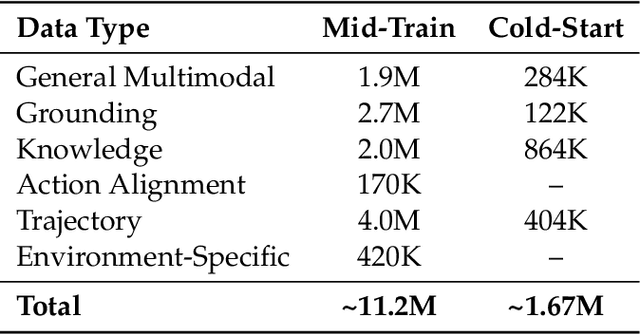
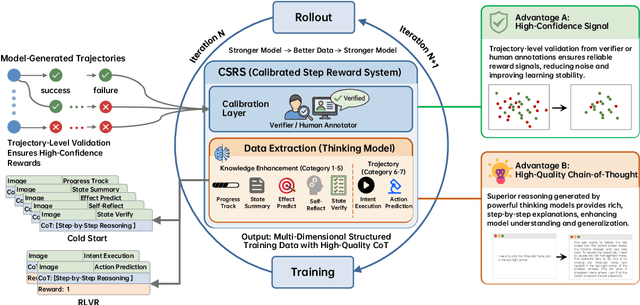
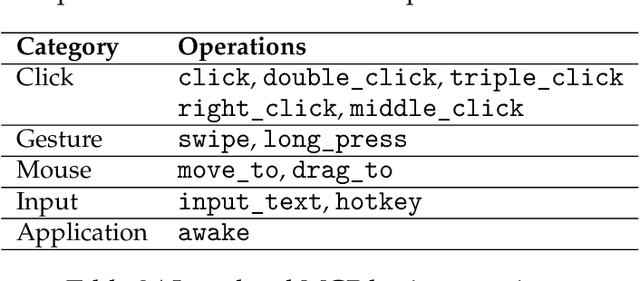
Abstract:Recent advances in multimodal large language models unlock unprecedented opportunities for GUI automation. However, a fundamental challenge remains: how to efficiently acquire high-quality training data while maintaining annotation reliability? We introduce a self-evolving training pipeline powered by the Calibrated Step Reward System, which converts model-generated trajectories into reliable training signals through trajectory-level calibration, achieving >90% annotation accuracy with 10-100x lower cost. Leveraging this pipeline, we introduce Step-GUI, a family of models (4B/8B) that achieves state-of-the-art GUI performance (8B: 80.2% AndroidWorld, 48.5% OSWorld, 62.6% ScreenShot-Pro) while maintaining robust general capabilities. As GUI agent capabilities improve, practical deployment demands standardized interfaces across heterogeneous devices while protecting user privacy. To this end, we propose GUI-MCP, the first Model Context Protocol for GUI automation with hierarchical architecture that combines low-level atomic operations and high-level task delegation to local specialist models, enabling high-privacy execution where sensitive data stays on-device. Finally, to assess whether agents can handle authentic everyday usage, we introduce AndroidDaily, a benchmark grounded in real-world mobile usage patterns with 3146 static actions and 235 end-to-end tasks across high-frequency daily scenarios (8B: static 89.91%, end-to-end 52.50%). Our work advances the development of practical GUI agents and demonstrates strong potential for real-world deployment in everyday digital interactions.
GeoSense: Evaluating Identification and Application of Geometric Principles in Multimodal Reasoning
Apr 17, 2025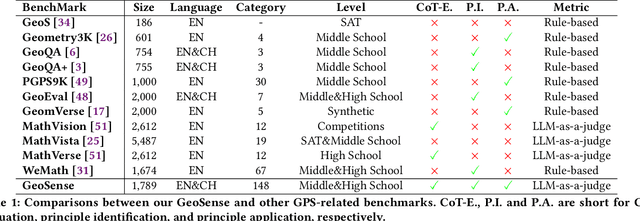
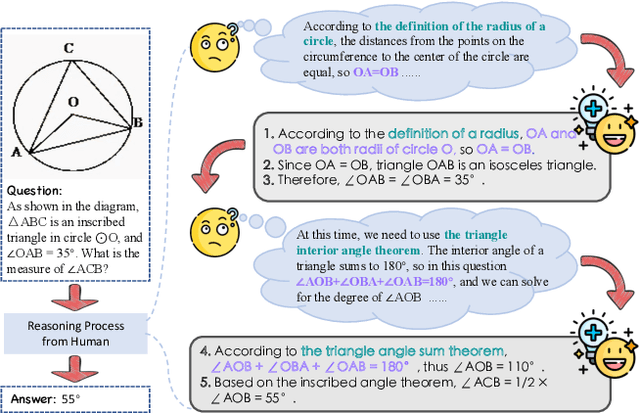
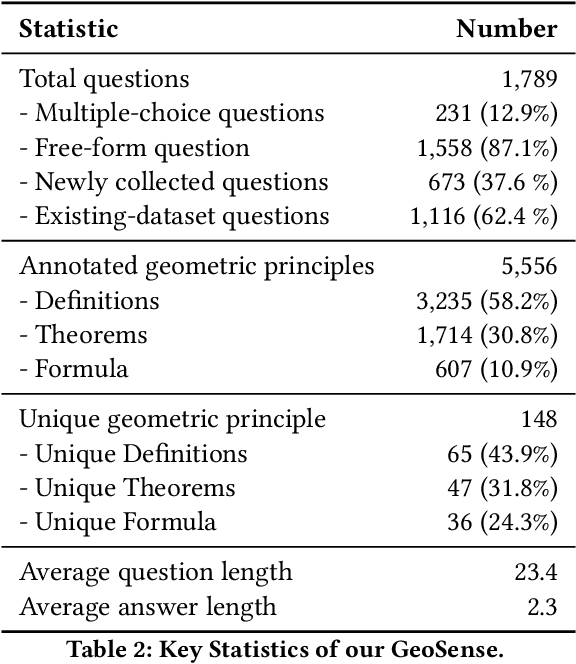
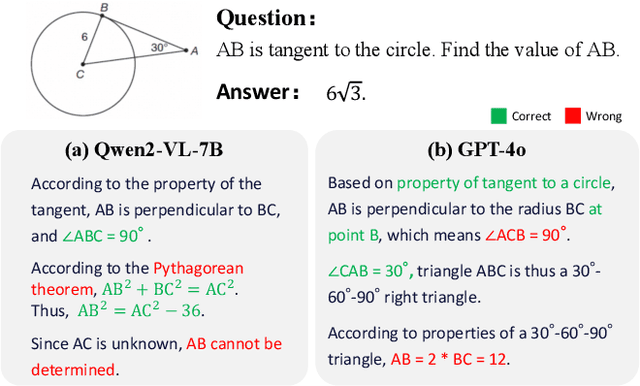
Abstract:Geometry problem-solving (GPS), a challenging task requiring both visual comprehension and symbolic reasoning, effectively measures the reasoning capabilities of multimodal large language models (MLLMs). Humans exhibit strong reasoning ability in this task through accurate identification and adaptive application of geometric principles within visual contexts. However, existing benchmarks fail to jointly assess both dimensions of the human-like geometric reasoning mechanism in MLLMs, remaining a critical gap in assessing their ability to tackle GPS. To this end, we introduce GeoSense, the first comprehensive bilingual benchmark designed to systematically evaluate the geometric reasoning abilities of MLLMs through the lens of geometric principles. GeoSense features a five-level hierarchical framework of geometric principles spanning plane and solid geometry, an intricately annotated dataset of 1,789 problems, and an innovative evaluation strategy. Through extensive experiments on GeoSense with various open-source and closed-source MLLMs, we observe that Gemini-2.0-pro-flash performs best, achieving an overall score of $65.3$. Our in-depth analysis reveals that the identification and application of geometric principles remain a bottleneck for leading MLLMs, jointly hindering their reasoning abilities. These findings underscore GeoSense's potential to guide future advancements in MLLMs' geometric reasoning capabilities, paving the way for more robust and human-like reasoning in artificial intelligence.
CombatVLA: An Efficient Vision-Language-Action Model for Combat Tasks in 3D Action Role-Playing Games
Mar 12, 2025
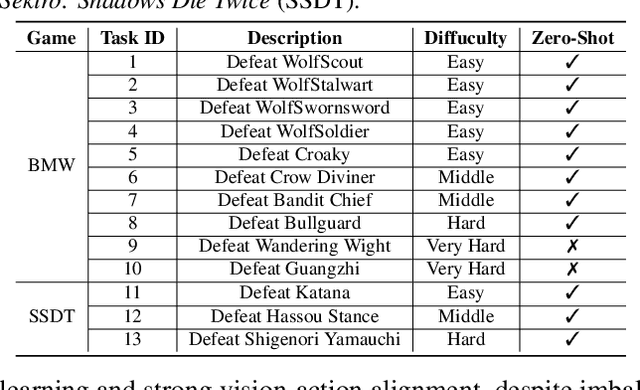

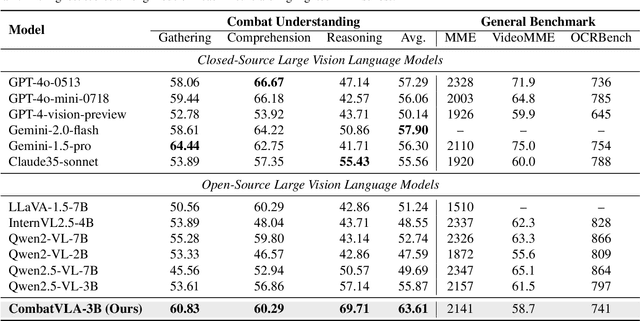
Abstract:Recent advances in Vision-Language-Action models (VLAs) have expanded the capabilities of embodied intelligence. However, significant challenges remain in real-time decision-making in complex 3D environments, which demand second-level responses, high-resolution perception, and tactical reasoning under dynamic conditions. To advance the field, we introduce CombatVLA, an efficient VLA model optimized for combat tasks in 3D action role-playing games(ARPGs). Specifically, our CombatVLA is a 3B model trained on video-action pairs collected by an action tracker, where the data is formatted as action-of-thought (AoT) sequences. Thereafter, CombatVLA seamlessly integrates into an action execution framework, allowing efficient inference through our truncated AoT strategy. Experimental results demonstrate that CombatVLA not only outperforms all existing models on the combat understanding benchmark but also achieves a 50-fold acceleration in game combat. Moreover, it has a higher task success rate than human players. We will open-source all resources, including the action tracker, dataset, benchmark, model weights, training code, and the implementation of the framework at https://combatvla.github.io/.
ChineseSimpleVQA -- "See the World, Discover Knowledge": A Chinese Factuality Evaluation for Large Vision Language Models
Feb 19, 2025Abstract:The evaluation of factual accuracy in large vision language models (LVLMs) has lagged behind their rapid development, making it challenging to fully reflect these models' knowledge capacity and reliability. In this paper, we introduce the first factuality-based visual question-answering benchmark in Chinese, named ChineseSimpleVQA, aimed at assessing the visual factuality of LVLMs across 8 major topics and 56 subtopics. The key features of this benchmark include a focus on the Chinese language, diverse knowledge types, a multi-hop question construction, high-quality data, static consistency, and easy-to-evaluate through short answers. Moreover, we contribute a rigorous data construction pipeline and decouple the visual factuality into two parts: seeing the world (i.e., object recognition) and discovering knowledge. This decoupling allows us to analyze the capability boundaries and execution mechanisms of LVLMs. Subsequently, we evaluate 34 advanced open-source and closed-source models, revealing critical performance gaps within this field.
Automatic Instruction Evolving for Large Language Models
Jun 02, 2024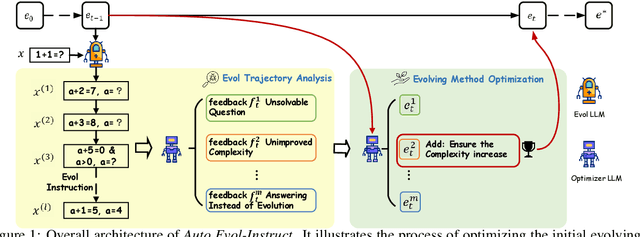
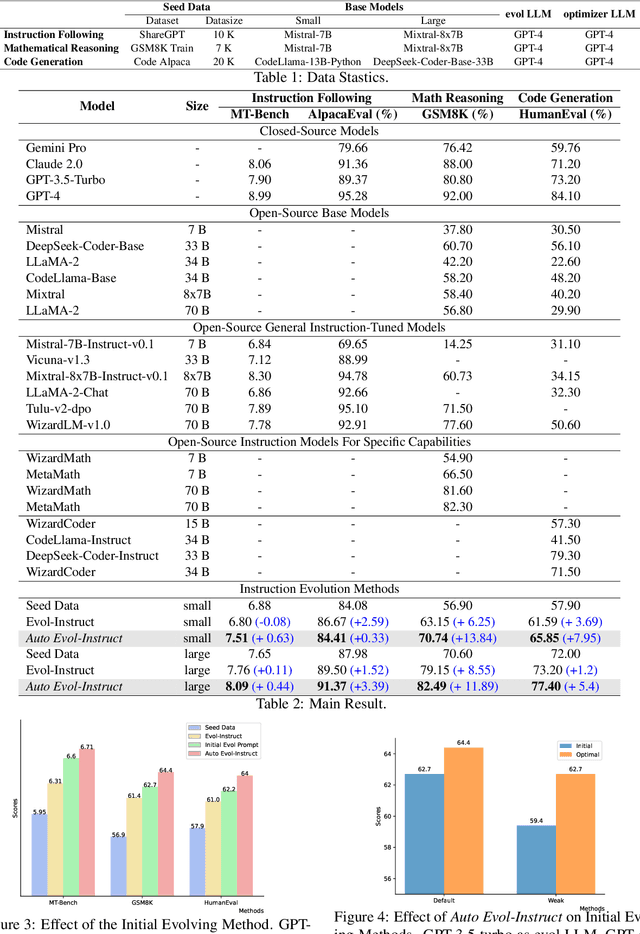
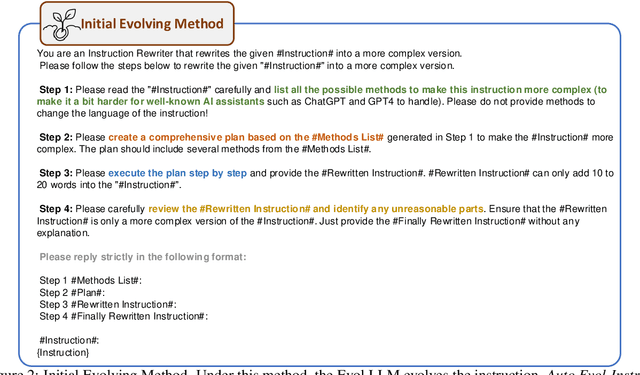

Abstract:Fine-tuning large pre-trained language models with Evol-Instruct has achieved encouraging results across a wide range of tasks. However, designing effective evolving methods for instruction evolution requires substantial human expertise. This paper proposes Auto Evol-Instruct, an end-to-end framework that evolves instruction datasets using large language models without any human effort. The framework automatically analyzes and summarizes suitable evolutionary strategies for the given instruction data and iteratively improves the evolving method based on issues exposed during the instruction evolution process. Our extensive experiments demonstrate that the best method optimized by Auto Evol-Instruct outperforms human-designed methods on various benchmarks, including MT-Bench, AlpacaEval, GSM8K, and HumanEval.
Tapilot-Crossing: Benchmarking and Evolving LLMs Towards Interactive Data Analysis Agents
Mar 08, 2024



Abstract:Interactive Data Analysis, the collaboration between humans and LLM agents, enables real-time data exploration for informed decision-making. The challenges and costs of collecting realistic interactive logs for data analysis hinder the quantitative evaluation of Large Language Model (LLM) agents in this task. To mitigate this issue, we introduce Tapilot-Crossing, a new benchmark to evaluate LLM agents on interactive data analysis. Tapilot-Crossing contains 1024 interactions, covering 4 practical scenarios: Normal, Action, Private, and Private Action. Notably, Tapilot-Crossing is constructed by an economical multi-agent environment, Decision Company, with few human efforts. We evaluate popular and advanced LLM agents in Tapilot-Crossing, which underscores the challenges of interactive data analysis. Furthermore, we propose Adaptive Interaction Reflection (AIR), a self-generated reflection strategy that guides LLM agents to learn from successful history. Experiments demonstrate that Air can evolve LLMs into effective interactive data analysis agents, achieving a relative performance improvement of up to 44.5%.
A Preliminary Study of the Intrinsic Relationship between Complexity and Alignment
Aug 10, 2023Abstract:Training large language models (LLMs) with open-domain instruction data has yielded remarkable success in aligning to end tasks and user preferences. Extensive research has highlighted that enhancing the quality and diversity of instruction data consistently improves performance. However, the impact of data complexity, as a crucial metric, remains relatively unexplored in three aspects: (1) scaling law, where the sustainability of performance improvements with increasing complexity is uncertain, (2) additional tokens, whether the improvement brought by complexity comes from introducing more training tokens, and (3) curriculum tuning, where the potential advantages of incorporating instructions ranging from easy to difficult are not yet fully understood. In this paper, we propose \textit{tree-instruct} to systematically enhance the complexity of instruction data in a controllable manner. This approach adds a specified number of nodes into the instruction semantic tree, yielding new instruction data based on the modified tree. By adjusting the number of added nodes, we can control the difficulty level in the modified instruction data. Our preliminary experiments reveal the following insights: (1) Increasing complexity consistently leads to sustained performance improvements. For instance, using 1,000 instruction data and 10 nodes resulted in a substantial 24\% increase in win rate. (2) Under the same token budget, a few complex instructions outperform diverse yet simple instructions. (3) Curriculum instruction tuning might not yield the anticipated results; focusing on increasing complexity appears to be the key.
Causal Document-Grounded Dialogue Pre-training
May 19, 2023Abstract:The goal of document-grounded dialogue (DocGD) is to generate a response by grounding the evidence in a supporting document in accordance with the dialogue context. This process involves four variables that are causally connected. Recently, task-specific pre-training has greatly boosted performances on many downstream tasks. Existing DocGD methods, however, continue to rely on general pre-trained language models without a specifically tailored pre-training approach that explicitly captures the causal relationships. To tackle this issue, we are the first to present a causally-complete dataset construction strategy for building million-level DocGD pre-training corpora. To better capture causality, we further propose a causally-perturbed pre-training strategy, which introduces causal perturbations on the variables and optimizes the overall causal effect. Experiments on three benchmark datasets demonstrate that our causal pre-training achieves considerable and consistent improvements under fully-supervised, low-resource, few-shot, and zero-shot settings.
Semi-Supervised Lifelong Language Learning
Nov 23, 2022



Abstract:Lifelong learning aims to accumulate knowledge and alleviate catastrophic forgetting when learning tasks sequentially. However, existing lifelong language learning methods only focus on the supervised learning setting. Unlabeled data, which can be easily accessed in real-world scenarios, are underexplored. In this paper, we explore a novel setting, semi-supervised lifelong language learning (SSLL), where a model learns sequentially arriving language tasks with both labeled and unlabeled data. We propose an unlabeled data enhanced lifelong learner to explore SSLL. Specially, we dedicate task-specific modules to alleviate catastrophic forgetting and design two modules to exploit unlabeled data: (1) a virtual supervision enhanced task solver is constructed on a teacher-student framework to mine the underlying knowledge from unlabeled data; and (2) a backward augmented learner is built to encourage knowledge transfer from newly arrived unlabeled data to previous tasks. Experimental results on various language tasks demonstrate our model's effectiveness and superiority over competitive baselines under the new setting SSLL.
 Add to Chrome
Add to Chrome Add to Firefox
Add to Firefox Add to Edge
Add to Edge